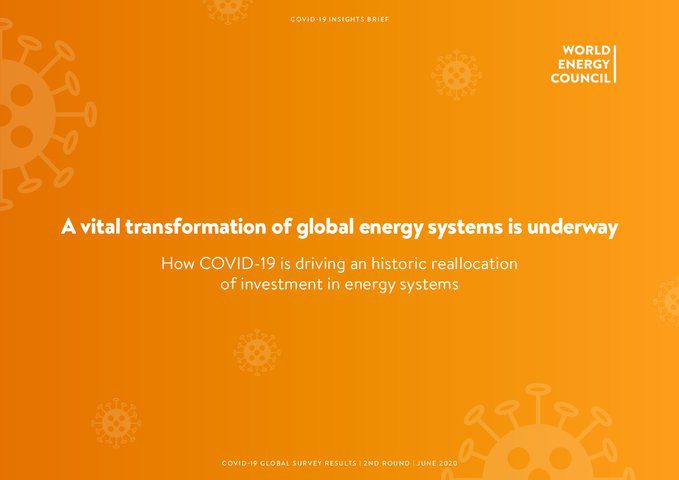Pandemic delivers seismic shock to global energy system, World Energy Council says

It is now clear that the COVID-19 pandemic will have a fundamental impact on the world’s energy systems and on the pace and direction of the global transition. Dramatic cuts in spending and a reallocation of funds into digital solutions and environmental sustainability are among some of the most significant changes likely to emerge as a result of the crisis. These findings emerged from the World Energy Council’s global survey of its extensive network of energy leaders and experts in 61 countries.
The energy industry was under strain even before the pandemic, which exacerbated these weaknesses and led to the biggest ever decline in energy demand and sharply lower oil and gas prices.
The latest findings from these global surveys indicate that COVID-19 is driving an historic reallocation of investment which will impact future energy developments. The World Energy Council has also identified a three-stage model being adopted by energy companies in response to the COVID-crisis: Respond-Rebuild-Recreate. The findings indicate that some energy firms are already entering the Rebuild stage and re-allocating capital and resources.
Key findings from the survey which gathered responses from 225 energy experts in 61 countries across six continents include:
- A third of energy companies plan to shed jobs. This might mean 350,000 jobs at risk across the G7 economies.
- 1-in-3 plan to shut one or more business units in response to the conditions caused by the pandemic.
- Four out of five energy businesses plan drastic cost reductions
- 4-in-10 energy organisations report cutting operational expenses (OPEX) by more than 10%
- An estimated reduction of $200-$400 billion in capital expenditure (CAPEX) is expected based on pre-COVID estimates of total energy CAPEX $1.8 trillion and the Council survey findings
- 80% of organisations are making significant reallocation in investments towards digitalisation, R&D programmes and Environmental, Social and Governance (ESG) activities.
The Council is working with all major players across the energy world to test and design exit strategies that help manage progress in global energy transition for the benefit of all. These global surveys have informed the development of a set of four plausible post-crisis scenarios which describe alternative pathways for global energy transition.
Dr Angela Wilkinson, Secretary General & CEO, World Energy Council, comments: “The COVID-19 crisis is triggering the greatest financial capital re-allocation in history. No-one can predict the future. Only by convening informed and diverse viewpoints can the energy world help avoid a next global crisis and better prepare for the new normal. Now is the moment to shape a future of better energy for everyone and the environment.”
The future of energy after COVID-19 was discussed during an online conference on 17 June, marking the launch of the Road to Congress 2022 online event series. Alexander Novak, Minister of Energy of the Russian Federation General and Dr Angela Wilkinson, the Secretary General and CEO of the World Energy Council, were joined by leading experts in the energy sector to discuss their vision of the transition to a ‘new normal’ after the crisis. A recording of the full TV broadcast event is available to VIEW HERE.
The World Energy Council has been at the heart of global, regional and national energy debates for nearly a century, developing new thinking and driving effective cooperative action around the world to achieve the benefits of better energy for all.
Comprised of over 3,000 member organisations in nearly 90 countries, drawn from governments, private and state corporations, academia and reaching out to new energy transition leaders and shapers beyond the energy industry, the Council is the world’s only impartial and truly global member-based energy network.
The Council’s global convening power and deep, whole system expertise help to shape a global energy leadership agenda and promote effective cooperation between diverse interests and needs, as well as to drive practical action to scalable impact. Learn more visit www.worldenergy.org


